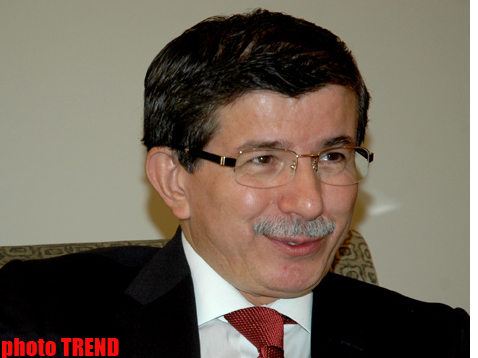Turkey's foreign minister accused Syrian President Bashar al-Assad of arming a Kurdish militant group that has fought the Turkish state for decades, potentially exacerbating a conflict which has killed more than 40,000 people, Reuters reported.
Clashes between the Turkish army and Kurdistan Workers Party (PKK) militants have intensified in recent weeks east of the border with Syria in southeast Turkey. Ankara is concerned the PKK is exploiting the chaos in Syria to expand its influence.
On Thursday suspected PKK militants ambushed a Turkish military bus in the western province of Izmir, killing a soldier and wounding at least 11 people.
Foreign Minister Ahmet Davutoglu told Turkish media while travelling to Myanmar overnight that Assad had given weapons to the PKK, which has established a presence in the towns of Kobani and Afrin in northern Syria.
"Assad gave them weapons support. Yes - this is not a fantasy. It is true. We have taken necessary measures against this threat," news websites reported the minister as saying.
There was no immediate comment from Damascus. In an interview with a Turkish newspaper at the start of July, Assad denied that Syria had allowed the PKK to operate on Syrian territory close to the Turkish frontier.
Davutoglu's comments spelled out allegations previously made by lower-ranking Turkish officials.
Turkey suspects a major Syrian Kurdish movement, the Democratic Union Party (PYD), of having links with the PKK. Turkish analysts believe Assad let the PYD take control of security of some towns in northern Syria to prevent locals from joining the rebel Free Syrian Army (FSA).
Relations between Ankara and Damascus have deteriorated to lows unimaginable just a few years ago, when Turkey cultivated "good neighbourly relations" with Assad, easing border controls and taking part in joint military exercises.
Turkish Prime Minister Tayyip Erdogan is now one of Assad's harshest critics and has raised the possibility of military intervention in Syria if the PKK becomes a threat there.
Military defectors have set up FSA bases in southern Turkey, and some are trained and coordinated by Turkish, Qatari and Saudi officers operating from a secret "nerve centre" near the city of Adana, Gulf sources have told Reuters.
Davutoglu, the architect of Turkey's now defunct good neighbours policy, dismissed criticism that Turkey was unprepared for the situation in northern Syria.
"There is unnecessary panic. You can be sure we anticipated all this ... Turkey's power to influence in Syria has not been weakened in any place or in any incident," he said.
Asked about the growing influence of the PYD, Davutoglu said: "They are hoping to take advantage if Assad goes and there is a (power) vacuum. But they will not succeed."
The issue of granting autonomy to any region should only be considered once a new parliament has been elected, he said.
"But if an armed group gains control of a place before the people have elected a parliament, another armed group can take control of another place. This is what we don't want to see."
The PYD has warned Turkey not to interfere in the region and said it has nothing to fear.
In 1998, Ankara came close to war with Assad's father, then-President Hafez al-Assad, over the presence of PKK leader Abdullah Ocalan in Damascus and alleged Syrian support for PKK activities in northeastern Syria.
Hafez al-Assad took the threat seriously enough to evict Ocalan - who was shortly afterwards captured in Kenya by Turkish forces with probable U.S. support. Ocalan is serving a life sentence in an island prison south of Istanbul.






